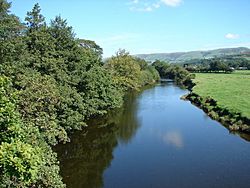River Dyfi facts for kids
Quick facts for kids River DyfiRiver Dovey |
|
|---|---|

The river viewed upstream
from the Jubilee Bridge near Mathafarn |
|
| Other name(s) | Welsh: Afon Dyfi |
| Country | Wales |
| Physical characteristics | |
| Main source | Creiglyn Dyfi 1,900 ft (580 m) |
| River mouth | Irish Sea |
| Length | 30 miles (48 km) |
The River Dyfi (which is Afon Dyfi in Welsh) is a river in Wales. It is about 30 miles (48 kilometers) long. The river's wide mouth, called an estuary, forms the natural boundary between two counties: Gwynedd and Ceredigion. For a long time, the lower part of the river was also seen as the dividing line between North Wales and South Wales.
Contents
Understanding the River Dyfi's Name
The name of the river is usually spelled Dyfi today. This Welsh spelling is used by local people, the Welsh Government, and even the BBC. However, you might still see the older English spelling, Dovey, used by some groups.
Exploring the River's Branches
Many smaller rivers and streams flow into the River Dyfi. These are called tributaries. They join the main river at different points along its path.
Major Tributaries of the Dyfi
- Afon Leri joins near Ynyslas.
- Afon Clettwr flows in north of Tre'r Ddol.
- Nant y Gog meets the river at Eglwys Fach.
- Afon Einion joins between Eglwys Fach and Glandyfi.
- Afon Llyfnant also joins at Glandyfi.
- The North Dulas (Afon Dulas) flows in at Ffridd Gate.
- The South Dulas (Afon Dulas) joins east of Machynlleth.
- Afon Ceirig meets the river at Mathafarn.
- Afon Twymyn joins upstream of Cemmaes Road (Glantwymyn).
- Afon Angell flows in at Aberangell.
- Afon Cleifion joins at Mallwyd.
- Afon Cerist meets the river at Dinas Mawddwy.
- Afon Cywarch joins at Aber-Cywarch.
The Famous Dyfi Bridge
A well-known road bridge crosses the River Dyfi just north of Machynlleth. This bridge is an important landmark in the area.
Discovering the Dyfi Biosphere
The area around Aberystwyth and the Dyfi Valley is very special. It is known as the Dyfi Biosphere (or Biosffer Dyfi in Welsh). UNESCO recognized it as a biosphere in 1978.
What is a Biosphere?
A biosphere is a place where people work to balance nature and human activity. It helps protect important plants and animals while also allowing people to live and work there.
Special Nature Areas in the Biosphere
Inside the Dyfi Biosphere, there are several protected natural areas. These include:
- Special Areas of Conservation: Places that protect important habitats and species.
- Sites of Special Scientific Interest (SSSIs): Areas chosen for their special wildlife, geology, or landforms. Examples here are Cors Fochno, Coed Cwm Einion, and Pen Llŷn a’r Sarnau.
Beavers Return to the Dyfi Valley
In March 2021, something exciting happened! Natural Resources Wales (NRW) allowed the Montgomeryshire Wildlife Trust to release up to six beavers into the Dyfi Valley. This was the first official time beavers were released in Wales. Beavers are known for building dams and changing landscapes, which can help other wildlife.
Saltmarshes in the Estuary
The Dyfi estuary is famous for its saltmarshes. These are coastal wetlands that are flooded by tides. They are important habitats for many birds and other creatures.
The Dyfi as a Film Location
The beautiful Dyfi estuary has even been featured in a movie! It was used as a filming location for the 1976 Led Zeppelin film, The Song Remains the Same. In one part of the film, the band's singer, Robert Plant, comes ashore from a boat. He then rides a horse towards Raglan Castle. The band's famous cottage, Bron-Yr-Aur, is also located near Machynlleth.
 | Janet Taylor Pickett |
 | Synthia Saint James |
 | Howardena Pindell |
 | Faith Ringgold |

